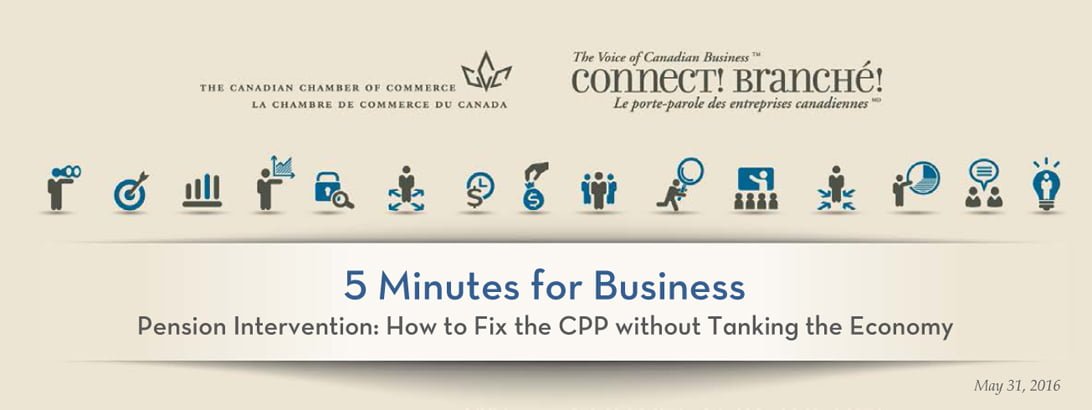On June 21, finance ministers are meeting to decide what to do with up to $800 billion of retirement savings. Here at the Canadian Chamber of Commerce, we’re worried a big tax increase is headed for the middle class like an elbow to the chest.
The government seems determined to increase contributions to the Canada Pension Plan, and the Finance Minister has said repeatedly that he hopes to reach an agreement with the provices by the end of 2016. With Ontario’s Retirement Pension Plan (ORPP) set to commence enrollment in 2017, the race is on to find a federal solution that will avert a patchwork of provincial programs cropping up.
This comes at the worst possible time—an economy reeling from weak commodity prices and slower consumer spending will be lucky to eke out growth of 1.5% next year. It’s difficult to stimulate the economy while pulling money out of the pockets of Canadians.
How much? The Canada Pension Plan (CPP) already costs 9.9% of one’s salary (shared equally by employee and employer). ORPP would add 3.8% (shared equally) on top of that, bringing us up to almost 14%. This is in addition to 4.5% for Employment Insurance as well as federal and provincial income taxes. All this would place Canada’s payroll tax burden up near the highest in the world (not quite France, but close), according to OECD’s report on taxing wages. Worse, the Conference Board estimates that ORPP would decrease household spending by $2.84 billion per year in the early years because benefit payments won’t start until 2022 and will be less than contributions until 2047!
We’ve all heard the argument that Canadians don’t save enough and we must act now! Actually, a study from McKinsey shows that 83% of Canadians will retire without significant adjustment in their standard of living. A report from CD Howe points out that the average income of Canadian seniors, adjusted for tax and family size, is 91% of the average income of working age Canadians and that seniors are better off financially than younger Canadians. Fred Vettese, who co-authored a book on retirement with Bill Morneau, says there is no retirement crisis because we understate certain income sources, such as real estate, and overestimate our spending in advanced ages.
The point is not that we should do nothing. Some workers are at risk: those who go from to job to job on contract find it more difficult to save. Seniors who depend on a spouse’s pension sometimes struggle when survivor benefits are clawed back. These folks should be helped with targeted programs, but the across-the-board ORPP will simply hurt the economy.
Instead, we can help the middle class by improving savings opportunities and providing better incentives. Firstly, the government’s recently announced increase to the Guaranteed Income Supplement will help the most at risk seniors. Secondly, Canadians, by default, should be “opted-in” to savings plans in order to provide the nudge they need, and savings incentives could be targeted towards those in the lower middle income levels. The government could also allow Canadians to voluntarily contribute more to the CPP. Finally, we need to emphasize personal choice and responsibility. The CPP is supposed to help us save, not guarantee income for all Canadians.
We hope that the finance ministers will not increase the tax burden on Canadian workers and businesses with sweeping increases. There are measures that could help us save without hurting our economy.
For more information, please contact :
Hendrik Brakel
Senior Director, Economic, Financial & Tax Policy
613.238.4000 (284) | hbrakel@chamber.ca



